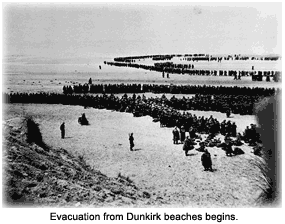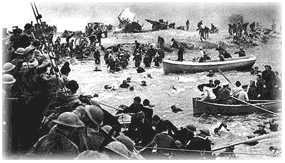 What happened at Dunkirk in May and June 1940 must rank as one of the greatest maritime evacuations in history, let alone World War II. Soldiers, sailors, and civilians were caught up in the events of those desperate days in the race against time to save Allied armies trapped in France. As British and French troops were forced into a shrinking pocket by the relentless onslaught of the German army, the Royal and Merchant navies, helped by a fleet of small civilian craft, launched a momentous effort to rescue them — and miraculously managed to save more than 338,000 men in just 10 days.
Winston Churchill had been British prime minister for only 16 days when he was faced with a potential military disaster. Nearly the entire British Expeditionary Force in France was in danger of being captured or killed, and some cabinet colleagues wanted to sue for peace in order to save them. Churchill insisted on fighting and pressing ahead with the evacuation.
When Churchill ordered the beginning of Operation Dynamo (evacuation code name), the first gloomy estimates were that only 45,000 of the soldiers trapped on the beaches could be rescued, but 10 days later more than 338,000 had been brought home. The bulk of the troops crossed the channel in Royal and Merchant navy ships.
A fleet of smaller civilian craft played a crucial role by making repeated trips between the beaches and larger vessels waiting offshore, often under heavy bombardment and with no means of defense. By the time Operation Dynamo was over, some 68,000 men had been killed or captured, among them some of the civilians that had volunteered to crew their own boats to help in the evacuation.
What happened at Dunkirk in May and June 1940 must rank as one of the greatest maritime evacuations in history, let alone World War II. Soldiers, sailors, and civilians were caught up in the events of those desperate days in the race against time to save Allied armies trapped in France. As British and French troops were forced into a shrinking pocket by the relentless onslaught of the German army, the Royal and Merchant navies, helped by a fleet of small civilian craft, launched a momentous effort to rescue them — and miraculously managed to save more than 338,000 men in just 10 days.
Winston Churchill had been British prime minister for only 16 days when he was faced with a potential military disaster. Nearly the entire British Expeditionary Force in France was in danger of being captured or killed, and some cabinet colleagues wanted to sue for peace in order to save them. Churchill insisted on fighting and pressing ahead with the evacuation.
When Churchill ordered the beginning of Operation Dynamo (evacuation code name), the first gloomy estimates were that only 45,000 of the soldiers trapped on the beaches could be rescued, but 10 days later more than 338,000 had been brought home. The bulk of the troops crossed the channel in Royal and Merchant navy ships.
A fleet of smaller civilian craft played a crucial role by making repeated trips between the beaches and larger vessels waiting offshore, often under heavy bombardment and with no means of defense. By the time Operation Dynamo was over, some 68,000 men had been killed or captured, among them some of the civilians that had volunteered to crew their own boats to help in the evacuation.
 Until the operation was complete, the British prognosis had been gloomy, with Churchill warning the House of Commons to expect "hard and heavy tidings." Subsequently, Churchill referred to the outcome as a "miracle," and appeals to the "Dunkirk spirit" — of triumph in the face of adversity — are still heard in Britain today. The successful evacuation of so many soldiers, previously thought lost, provided a great boost to British morale at a time of peril. The British press presented the evacuation as a "Disaster Turned to Triumph" so successfully that Churchill had to remind the country, in a speech to the House of Commons on June 4, that "We must be very careful not to assign to this deliverance the attributes of a victory. Wars are not won by evacuations."
Some of the evacuated troops, both French and British, were shipped straight back to the battle of France via ports in Normandy and Brittany, where most were killed or captured. After the French surrender, a majority of the rescued French troops returned to their homeland, but a few chose to join the Free French and continued to fight. Most of the rescued British soldiers were assigned to the Britain's defense, but once the threat of invasion declined, they were transferred overseas to the Middle East and other theaters. Many served as the core of the much-enlarged army that returned to France in 1944.
Until the operation was complete, the British prognosis had been gloomy, with Churchill warning the House of Commons to expect "hard and heavy tidings." Subsequently, Churchill referred to the outcome as a "miracle," and appeals to the "Dunkirk spirit" — of triumph in the face of adversity — are still heard in Britain today. The successful evacuation of so many soldiers, previously thought lost, provided a great boost to British morale at a time of peril. The British press presented the evacuation as a "Disaster Turned to Triumph" so successfully that Churchill had to remind the country, in a speech to the House of Commons on June 4, that "We must be very careful not to assign to this deliverance the attributes of a victory. Wars are not won by evacuations."
Some of the evacuated troops, both French and British, were shipped straight back to the battle of France via ports in Normandy and Brittany, where most were killed or captured. After the French surrender, a majority of the rescued French troops returned to their homeland, but a few chose to join the Free French and continued to fight. Most of the rescued British soldiers were assigned to the Britain's defense, but once the threat of invasion declined, they were transferred overseas to the Middle East and other theaters. Many served as the core of the much-enlarged army that returned to France in 1944.